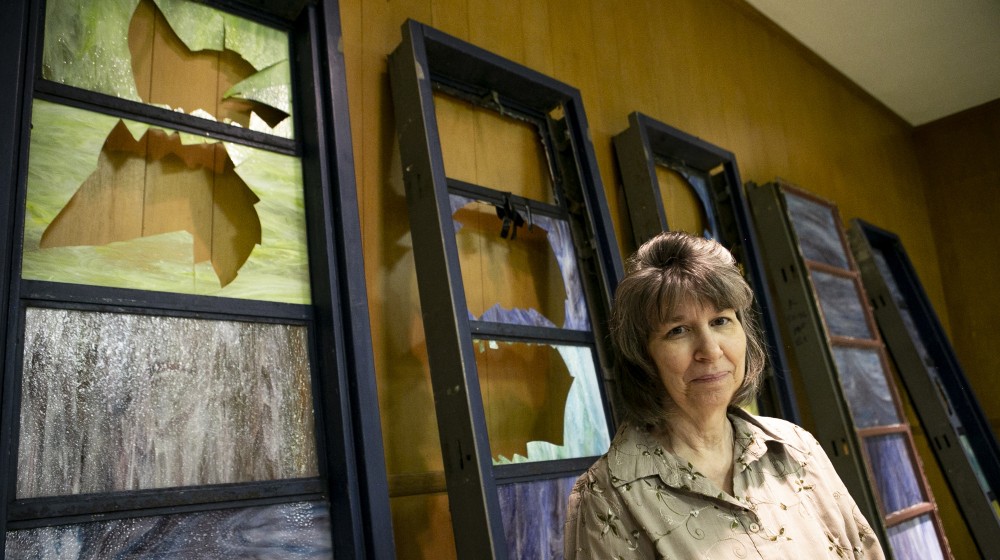Months after Illinois congresswoman’s Hitler remarks, local Jews remain in pain

Shortly after US Rep. Mary Miller of Oakland, Illinois, said in a January speech that “Hitler was right” about youth indoctrination, Jewish leaders from the state arranged a Zoom call. They hoped to help her understand the pain caused by the comments she delivered on the steps of the United States Capitol, the day before insurrectionists breached the building.
The freshman Republican from the 15th District listened during the call, said Karen Aroesty, regional director of the Anti-Defamation League’s St. Louis office. But she’s not sure what Miller took away from the conversation.
“I’m disappointed in Congresswoman Miller,” Aroesty said. “I don’t know that she really made the connections that I would have liked to hear her make about the impact of what she said.”
After Miller’s comments on January 5, the ADL shared with her office a list of 12 antisemitic incidents and 17 instances of White supremacist propaganda that took place in her district between 2019 and 2020.
The group’s midwestern regional director, David Goldenberg, said the ADL’s main goal with elected officials is to share information about extremist activity. The ADL wanted Miller to become aware of “what was going on in and around her district,” he said.
Read our latest issue or browse back issues.
To the south of Miller’s district in October, vandals broke into the United Hebrew Temple in Benton, shattering stained-glass windows and ransacking the sanctuary. It was the third such incident at the synagogue since September. Nine days after Miller’s speech, a White supremacist group hung a banner with a racist and anti-immigrant slogan on a monument in nearby Danville that honors World War I veterans, according to the ADL’s map of hate incidents.
There are at least three known White supremacist groups ADL Midwest has connected to harassment and the distribution of flyers and propaganda in Miller’s district, based on reporting from the public: Loyal White Knights, New Jersey European Heritage Association, and Patriot Front.
Goldenberg wasn’t aware if Miller’s office planned to do anything with the information the ADL shared.
“You’d have to ask her,” he said.
A spokeswoman for Miller’s office said the congresswoman did not have time in her schedule to be interviewed for this story. Her office did not respond to a list of written questions.
Miller’s colleague to the south, fellow Republican Mike Bost of Illinois’s 12th Congressional District, said he spoke with Miller after her comments and doesn’t believe she “meant anything personal by it.” But he said it’s also essential to support Jewish communities, especially during a time when they feel threatened.
“We need to make sure there’s a clear message sent,” Bost said. “We need to make sure we understand the concerns they face.”
Like the rest of the population in Miller’s district, the Jewish community has dwindled. Researcher and author Sybil Mervis, one of roughly a dozen Jews left in Danville, said their contributions to the community have been largely forgotten in the city that now numbers about 31,000, down 15 percent since 1980.
“Jewish communities existed in Southern and central Illinois for over 150 years. The first Jews came to Danville in about 1850,” Mervis said. “Nowadays unfortunately these communities have diminished, and as a result, ignorance about Jewish life and culture has taken root.”
This has left a more homogenized group of people who have not been exposed to people unlike themselves, said her son Michael Mervis, 57. Born and raised in Danville, he now lives in Indiana running Mervis Industries, the recycling firm founded more than a century ago by his great-grandfather. Companies such as General Motors gradually left southeastern Illinois. The people followed.
“You lose the vibrancy that comes with diversity, because you don’t have that breadth of people that you have in more thriving areas,” Michael Mervis said.
Comments such as Miller’s would have been “unthinkable” 30 years ago, he added. It’s not just an issue of antisemitism. He worries about recent anti-Asian attacks and hatred toward any other cultural or ethnic group.
Aroesty said Miller could send a message to constituents that she supports the Jewish community by introducing a nonbinding resolution in Congress promoting early Holocaust education, or something similar. Educating people about the problems with Holocaust analogies could prevent speeches like Miller’s in the future, she added.
Supporting technology and lessons in the classroom that bring Holocaust survivor voices alive could also be an effective move for Miller, Aroesty said.
Jewish leaders remain hopeful their call will make Miller think twice in the future, but without further evidence they’re not convinced.
“She heard from plenty of different voices, but I suspect in the long run we’re not going to be anything but disappointed,” Aroesty said. “We need to empower and learn affirmatively and early on so we reduce these numbers of incidents.” That would allow people to “come into these conversations not being so defensive and vulnerable, but willingly learning.”
Karen Uban, vice president of the vandalized United Hebrew Temple in Benton, said she believes love still outweighs hate in Southern Illinois. Donors raised thousands within weeks to repair the Benton temple and install security equipment, she said. Much of the support came from Christian churches.
“They’re not Jewish, but they just reached out because something struck a chord with them, because this is not right,” she said.
“We’re always going to have a certain percentage of people who are so stubbornly opposed to anything different at all that you’re going to have trouble with them,” Uban said. “But a lot of people have problems because they simply don’t understand.”
“We’re still having Passover like we have for 3,300 years. So, I’m happy to say we’re not going anywhere.” —Belleville News-Democrat






